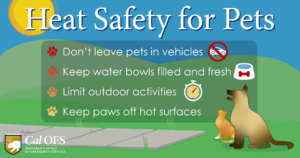Summer in California brings sunshine, longer days – and at times extreme heat. As high temperatures appear across the state, the California Governor’s Office of Emergency Services (Cal OES) reminds everyone: protect your pets from overheating.
When walking or playing with your pets outside, knowing the signs of overheating is important to seek emergency veterinary care, according to the California Department of Public Health.
Watch for:
- Excessive panting
- Difficulty breathing
- Excessive drooling
- Unsteadiness
- Dry or sticky gums
- Vomiting or diarrhea
- Weakness
Overheating can be very scary and dangerous for your pets, knowing the signs and how to prevent overheating can help keep them safe.
When outdoors with your pet:
- Exercise your pet during the morning or evening when the sun is not at its peak. If the ground is too hot for your bare feet, it is hot for their paws, too.
- Older and at-risk pets may have difficulty handling the extreme heat.
- Ensure your pet has lots of fresh clean water. As temperatures increase so does the amount of water your animal might need. Make sure this water is not left in the sun; this could cause the water to be too hot for your pet.
- If outdoors, take shade breaks and try to keep off the asphalt.
- Visit your vet to know your pet’s health risks.

Hot weather tips for pets:
- Sunburn
- Pets can get sunburned. When your pet is outside, ensure they have access to shade, cool water and the ability to go indoors.
- Car Safety
- Never leave pets alone inside a car. Even when it is mild outside, temperatures inside a car climb fast and can quickly turn fatal. It is illegal in California to leave a pet inside a car under conditions that could endanger their health or well-being.
- Water Safety
- When visiting the water, make sure your pet knows how to swim or has a lifejacket. Not all pets are good swimmers and leaving them unsupervised can be dangerous.
- Fleas and Ticks
- When returning indoors, check your pets for ticks. To avoid ticks, ask your vet about collars or medication.
